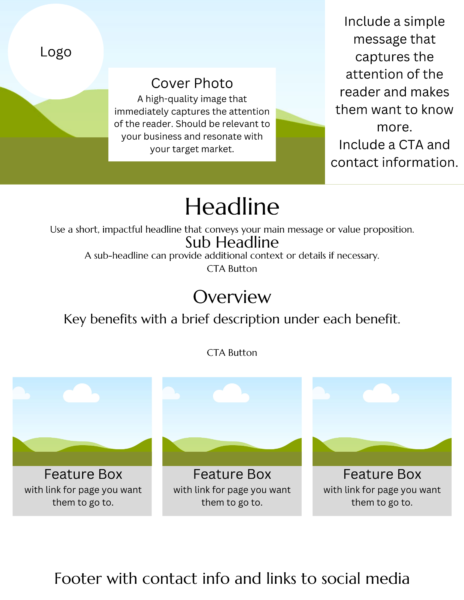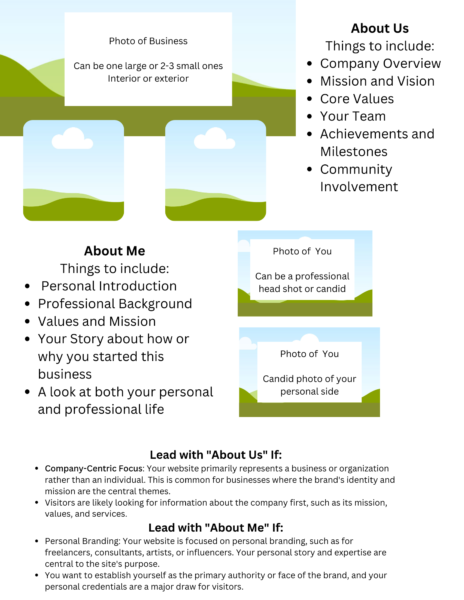“Marketing Made Easy:
A Beginner’s Guide to Growing Your Business”
Step 3
Create a Basic Website to make your business searchable.
Why is it important to have a website?
There was a time, not too long ago, where small business owners didn’t really see the value in creating a website. Why did they need to be searchable?
Sure, they might have a Facebook page, but even that was sort of an afterthought, rather than a marketing strategy.
Then March 2020 happened and changed how pretty much everyone had to rethink their marketing strategy.
All of a sudden you couldn’t just open your doors and people would come in. Suddenly, marketing was not even remotely easy. It became quite the challenge, in fact.
So, that should help you see where we are going with why it is important to have even a basic website. Let’s break it down:
-
Everyone needs to be searchable, and a website is the best way to make your business searchable.
-
People check us out online before they ever reach out to us.
-
Credibility and Trust: A professional-looking website helps build credibility and trust with potential customers. It shows that your business is legitimate and established.
-
Marketing and Branding: A website is a platform to showcase your brand, products, or services. It allows you to control the narrative and present your business in the best possible light. The reality is that this is “your real estate” that you have absolute control over what you post, who sees it and when they see it.
-
Customer Convenience: Customers can access information about your business, such as location, hours of operation, and contact details, at any time. You might not be able to be open 24/7 but your website certain can!
-
Sales and Leads: A website can serve as a sales tool, providing information that can drive sales and generate leads. If this is part of operating your business, and who doesn’t need sales and leads, your website can do that for you.
-
Competitive Advantage: Many businesses, including your competitors, have websites. Not having one can put you at a disadvantage. If your competitors don’t happen to have a website, the advantage is even greater for you. You can show up in searches that they won’t.
-
Analytics and Insights: A website can provide valuable data and insights about your visitors, their behavior, and preferences. This is often an area that doesn’t get the attention it should but these analytics can help you make smart marketing decisions.
-
Showcasing Products and Services: You can display your products and services, share customer testimonials, and highlight any special offers or promotions on your website. Give visitors to your site the opportunity to really understand your business.
Go back to your target market we discussed in Step 1 and keep them in mind as you create your website.
What would attract them to your website? What would they type in a Google search that would bring up your site? What would they expect to find once they got there?
What are the very basics you want to have on your website?
Please don’t let the thought of creating a website, or the list below, scare you away. If you had nothing more than a Home Page and an About page, you would be searchable. It is definitely a way to get started. You’ll find most of the items on this list would be part of the Home and About Page to simplify the task.
-
Home Page: The main entry point that introduces your business and provides a brief overview of what you offer. It should be visually appealing and user-friendly.
This is a simple layout that shows you the components of an effective home page. There are all kinds of templates out there, but you want to make sure it is a layout that grabs your reader’s attention and keeps them scrolling down the page and exploring all you have to offer.

-
About Page: Information about your business, including its history, mission, values, and the team behind it. This helps build trust and gives visitors a sense of who you are.
If you’d like more help, check out this free guide.
Create a Compelling Abou Us Page
-
Products/Services Page: Detailed information about the products or services you offer. Include descriptions, images, pricing, and any other relevant details to help potential customers understand what you provide. You do not need to make this an e-commerce page if you don’t feel like you could do that, but you do want to find a way to make sure a visitor to your site knows what you do and what you have to offer them.
-
Contact Page: Contact information, including your business address, phone number, email address, and a contact form. This makes it easy for customers to reach out to you. This is included at the bottom of your home page. You will want to decide how you want them to contact you. Will it be email, phone or something else. The contact form will be set up to manage that.
-
Location and Hours: If you have a physical location, provide your address, a map, and your hours of operation. This helps customers find you and know when you’re open. If you are home based, or by appointment, you can note how you can work with them.
-
Call to Action (CTA): Clear and compelling CTAs throughout the website, encouraging visitors to take specific actions such as making a purchase, signing up for a newsletter, or contacting you. Get clear on what you want them to do when they come to your website. Set up an appointment? Call you? Download a document? Email you? Tell them what you want them to do.
-
Testimonials/Reviews: Positive feedback from satisfied customers to build credibility and trust. Testimonials can be placed on the home page, product/service pages, or a dedicated testimonials page. If you are brand new, and don’t have any testimonials yet, you can add this later. It is an important part of your marketing strategy because it provides social proof that you are who you say you are, and your products and services have been tested by real people.
-
Social Media Links: Links to your business’s social media profiles to help visitors connect with you on various platforms and stay updated with your latest news and promotions. Take advantage of every opportunity for people to find you and learn more about who you are and what you do. Make it easy with links to your social media platforms.
-
Privacy Policy: A clear privacy policy explaining how you collect, use, and protect visitors’ personal information. This is especially important if you collect any form of data from your website visitors. This is something that your web developer will work on with you to make sure you are compliant with all laws and regulations.
Finally-
You want to make sure it is Mobile-Friendly: Ensure your website is responsive and works well on mobile devices, as many users will access your site from their smartphones or tablets.
So, don’t let the idea of creating a website overwhelm you and keep you from making this central to your marketing strategy.
Reach out for help to get you moving forward.

